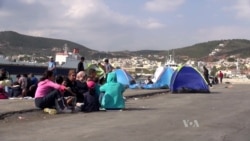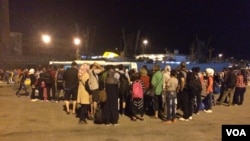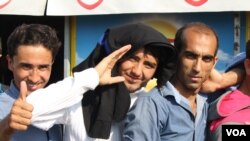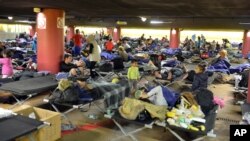Cell phone chargers occupied almost every electrical outlet on the ship and the Syrian girl sitting next to me plugged her iPhone into my laptop.
Most of the thousands of refugees aboard had arrived in Greece over the past few days on rubber boats after harrowing all-night journeys from Turkey. Many slept in parks near the port; others camped in tents by the boat that brought them from the island of Lesbos to Athens.
Anyone who had a phone plugged it in, readying apps that could later save their lives.
After Athens, the refugees almost uniformly planned to cross to Macedonia and Serbia before getting to Hungary, where they say anything can happen.
Hungary says it will start enforcing a law Tuesday that jails illegal crossers for three years.
To the passengers, getting in and out of Hungary and into more refugee friendly countries in Europe is everything. If they fail, many will have no choice but to return to places so hostile they are willing to sacrifice everything to get out.
“After coming all this long and dangerous way,” said Leelas, a young woman from Damascus. “To go back? It’s too much sad.”
Ahmed, one of six men I met last week who have since become a fiercely loyal group of friends, said the key to success is speed. He told the group the plan is to walk to the train station in Athens, because the bus station is close to the port and will be packed with refugees.
Easy Part for Some
As the hours passed on the large commercial ship, tense faces begin to relax. Enough people have rented beds in tiny four-person rooms to allow a stream of people in and out of the showers. Many people washed their clothes in the sinks and hung them on the broad, clean decks.
The poorest among us were from Afghanistan, doubly disadvantaged because there was no translator on board. While the masses of Syrians discussed strategies and took advantage of the boat’s facilities, some Afghan families huddled on the floor.
I ask Modar, one of the new friends, if those families had cheap or free tickets. “No way,” he said. Nothing is free for refugees on the road."
Indignity Jokes
The snack bar was expensive, so no one bought food, but Modar tried to get us water. The clerk refused to sell him more than one bottle because he hesitated when asked how many. “Why are you angry?” he asked her, visibly upset.
“Because you are holding up everybody,” she said, also upset. “You think everyone waits for you?”
We joked about a similar incident earlier in the day at lunch.
The loudspeaker had announced that lunch was served, first in Greek for the handful of non-refugee passengers downstairs, then in Arabic for most of the thousands of others.
The result was a flood of people eager to save their money for the dangerous journey ahead. When passengers started helping themselves to the buffet, staff members shouted: “Get out, get out!” and waved their arms at the confused crowd.
“I think he wants us to line up one by one,” said one man to his friends as they formed a queue. But they continued barking: “Get out!”
Then the dinner announcement blared on the loudspeaker. It was almost the same as it was at lunch, but concluded with a loud, “Not free.”
People all over the room guffawed and giggled. “Not free,” some repeated in Arabic, shaking their heads and smiling.
As the end of the 10-hour boat ride approached, faces again appeared tired and tense, worried about what lies ahead.
Zooming To Hungary
We saw the buses from the deck as the boat docked, and I wondered if the port was also the bus station.
Men who said they were drivers quickly gathered crowds around them and announced in Arabic that they would drive directly to the Macedonia border for a little more than $50 per person. At first the friends were skeptical. It’s a lot of money if it’s a scam.
But when they saw everyone else boarding they were frantic. What if they don’t get a seat? What if Greece is also trying to get all the refugees to Hungary before the wall is complete?
They hurried onto the bus and I stayed behind, videotaping thousands of people getting on buses, leaving only the poorest behind.
And those buses didn’t stop. Only hours later they walked over the Macedonia border and onto a train. The last text messages I have are a few hours old, saying they are now on their way through Serbia.









